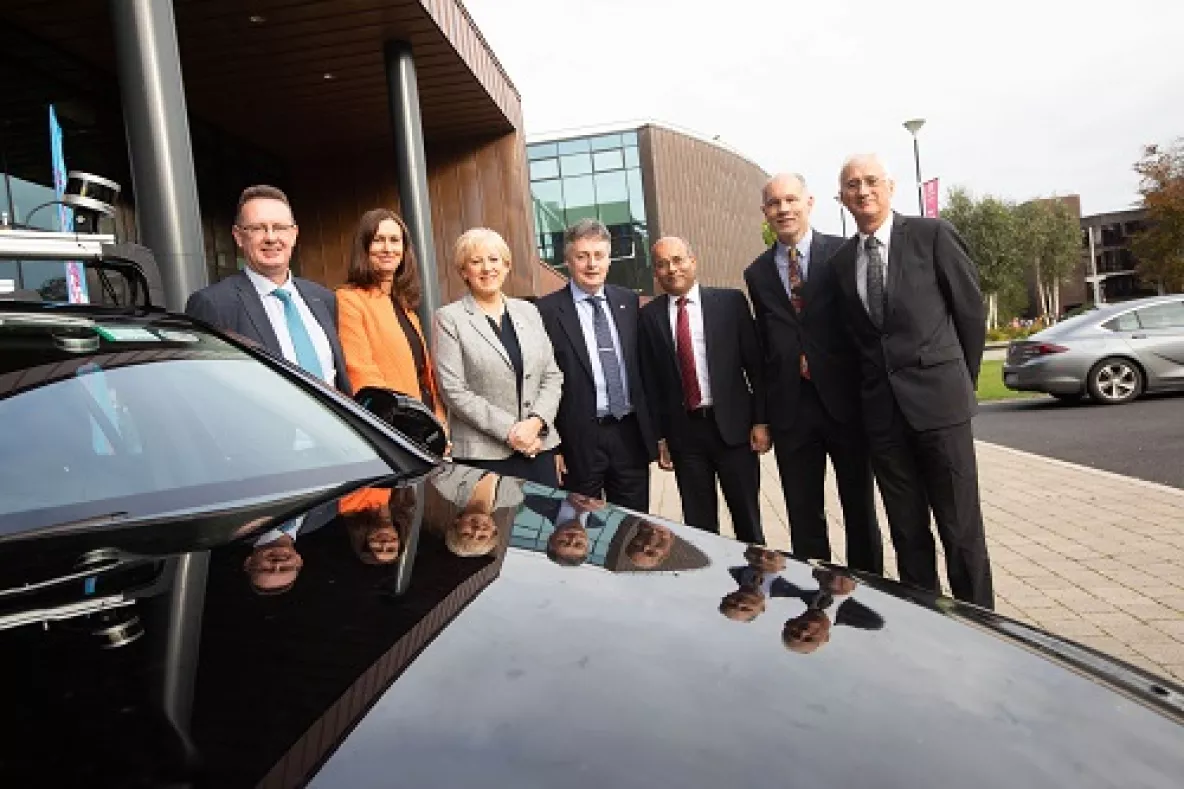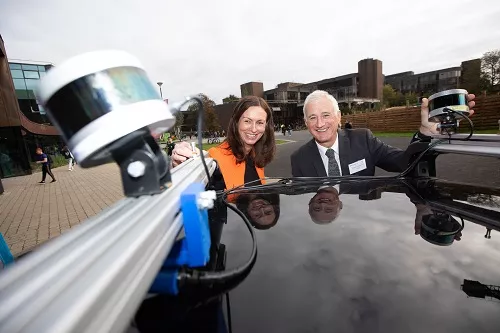
Heather Humphreys TD, Minister for Business, Enterprise, and Innovation, has visited University of Limerick to launch a Science Foundation Ireland backed €4.2m research collaboration on driverless vehicles led by Lero, the Irish Software Research Centre.
As part of the programme, researchers from Irish academia, global automotive and Irish firms will collaborate on key international challenges facing the development of driverless vehicles, especially those working in the same environments as pedestrians, animals and human-operated vehicles.
The project brings together 11 companies to work on a variety of autonomous systems projects across the automotive, industrial and agricultural sectors.
Researchers from across Lero, headquartered at UL, along with SFI research centres CONNECT and Insight, will work with multinational industry partners such as Jaguar Land Rover, Kostal, Liebherr and Valeo; large indigenous Irish companies like Combilift and Dairymaster and smaller Irish companies including Greenval, Mobimetrix, PMS Pavement Management Services Ltd, Reamda and Transpoco.
Speaking at the programme launch in UL's Glucksman Library this Wednesday, Minister Humphreys said: “I am delighted to be back here in the University of Limerick to launch this exciting €4.2 million research collaboration on driverless vehicles, which includes a contribution by Government of over €2 million through Science Foundation Ireland. Future Jobs Ireland is all about embracing innovation and technological change and this type of project is a great example of the capacity we have here in Ireland to be at the forefront of these cutting-edge developments. It is especially pleasing that in addition to the involvement of our universities this research also involves companies in Kerry, Galway, Clare, Limerick, Cork, Dublin and Monaghan.”

Dr Siobhan Roche, Director Science for the Economy, Science Foundation Ireland added: “Autonomous systems (AS) represent a disruptive technology that is a crucial component of many industries, all of which are key to Ireland's future growth. The research knowledge gained in this programme will help to build world-leading capability in AS, helping to establish Ireland as an important player in the autonomous IT eco-system and delivering outcomes that can play a significant part in Ireland’s economy.”
Professor Brian Fitzgerald, Director, Lero commented: “Revenues from autonomous systems have been projected to be worth over $100 billion by 20301. There is no reason why Ireland cannot be a serious research player in this vital sector.
“For example, we are already working with companies such as Valeo in Tuam on autonomous vehicle research and it is Ireland’s variable climate and streetscape which gives it an advantage over the more uniform climate and road networks of, for example, San Francisco.”
Dr Aisling O’Driscoll, funded investigator with CONNECT, the SFI Research Centre for Future Networks and Communications and lecturer at University College Cork, said: “The launch of this collaboration is a significant development as it brings together researchers from three key areas: software, analytics and connectivity. CONNECT's researchers will focus on the connectivity challenge. Connectivity is of central importance for autonomous vehicles, which will need to communicate and share information with each other, with the city infrastructure and with vulnerable road users such as pedestrians and cyclists. Working with our industry partners, we will explore ways to make communication networks faster, more reliable and capable of handling increased information flows, while preserving privacy. Ultimately, the goal is to make transport safer, less congested, and more environmentally friendly.”
Professor Noel O’Connor, interim CEO of Insight SFI Research Centre for Data Analytics, added: “We are working with industry partners to study driver attention and engagement with a view to ensuring that the driver is in the loop when required and that their interaction is commensurate with their capacity at that time. The industry-led partner project will use inexpensive and unobtrusive sensors, mainly cameras, addressing situations where decisions are required in real time. Research will use a user-centred methodology to aid in user acceptance of connected/autonomous vehicles.”
“Over the last few years we have been steadily expanding our research capabilities and experience in autonomous systems,” said Joe Gibbs, General Manager, Lero who was responsible for putting the consortium together.
“All of these projects will enhance the education and professional experience of PhD and post-doctoral level researchers in the area of autonomous systems. This will support the growing needs for such talent in both Irish-based multinationals and start-ups,” Mr Gibbs concluded.